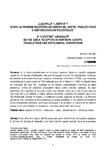¿Lazarillo Libertin? Sobre la primera recepción en Europa del Norte: traducciones e inspiraciones anticlericales

Use este enlace para citar
http://hdl.handle.net/2183/27521
A non ser que se indique outra cousa, a licenza do ítem descríbese como Atribución-NoComercial-CompartirIgual 4.0 Internacional
Metadatos
Mostrar o rexistro completo do ítemTítulo
¿Lazarillo Libertin? Sobre la primera recepción en Europa del Norte: traducciones e inspiraciones anticlericalesTítulo(s) alternativo(s)
A “Libertine” Lazarillo? On the Early Reception in Northern Europe: Translations and Anticlerical InspirationsAutor(es)
Data
2020Cita bibliográfica
Correard, Nicolas (2019). “¿Lazarillo “Libertin”? sobre la primera recepción en Europa del Norte: traducciones e inspiraciones anticlericales”. En Pilar Couto-Cantero, Rocío Chao-Fernández, Alfredo Rodríguez López-Vázquez & Arturo Rodríguez López-Abadía (eds.). Actas del Simposio del Lazarillo (A Coruña, 10-11 de octubre de 2019) (=Cursos_congresos_simposios; 148). A Coruña: Universidade da Coruña, pp. 29-42. DOI: https://doi.org/10.17979/spudc.9788497497657.29
Resumo
[Resumen] Se ha dicho repetidamente que el género picaresco deriva del Lazarillo castigado, cuando no del Guzmán de Alfarache, más que del Lazarillo original. Tal planteamiento olvida que las primeras traducciones francesas e inglesas se fundaban en el texto de 1554, cuya influencia, transmitida por la continuación de 1555 traducida a su vez en francés en 1598, se difundió hasta los principios del siglo XVII. Diseñada en un entorno probablemente erasmista, la sátira anticlerical, repleta de alusiones provocantes hacia ciertos dogmas católicos, no pasó inadvertida: los marginalia de las traducciones, por ejemplo, muestran un interés particular por este tema. No es de extrañar si relatos satíricos libremente inspirados del Lazarillo, tales como The Unfortunate Traveller de Nashe, el Euphormio Lusinini Satyricon de Barclay o la Première journée de Viau, adaptaron la sátira religiosa a su propia actualidad: en un contexto de desarrollo de los pensamientos libertinos, personajes de jesuitas y de puritanos se convirtieron en blancos nuevos de escenas novelísticas basadas en un modelo obviamente “lazarillesco”. [Abstract] It has often been argued that the picaresque genre derived from the Lazarillo castigado, if not from the Guzmán de Alfarache, more than from the original Lazarillo. Such an assumption neglects the fact that the first French and English translations did rely on the 1554 text, whose influence, conveyed by the 1555 sequel also translated in French in 1598, did last until the early 17th century. Probably designed in an Erasmian circle, the anticlerical satire, enhanced by provoking allusions to certain catholic dogmas, did not pass unnoticed: the marginal comments of the translations, for instance, testify for a strong interest for this theme. It is no wonder, therefore, if the first satirical narratives freely inspired by the Lazarillo, such like The Unfortunate Traveller by Nashe, the Euphormio Lusinini Satyricon by Barclay, or the Première journée by Viau, adapted its religious satire to their own actuality: in the context of the rise of libertine thinking, characters of Jesuits and Puritans could become new targets for novelistic scenes based on an obviously “lazarillesque” model.
Palabras chave
Lazarillo de Tormes
Traducción
Sátira
Anticlericalismo
Libertinaje erudito
Translation
Satire
Anticlericalism
Free-thinking
Traducción
Sátira
Anticlericalismo
Libertinaje erudito
Translation
Satire
Anticlericalism
Free-thinking
Versión do editor
Dereitos
Atribución-NoComercial-CompartirIgual 4.0 Internacional
ISBN
978-84-9749-765-7






